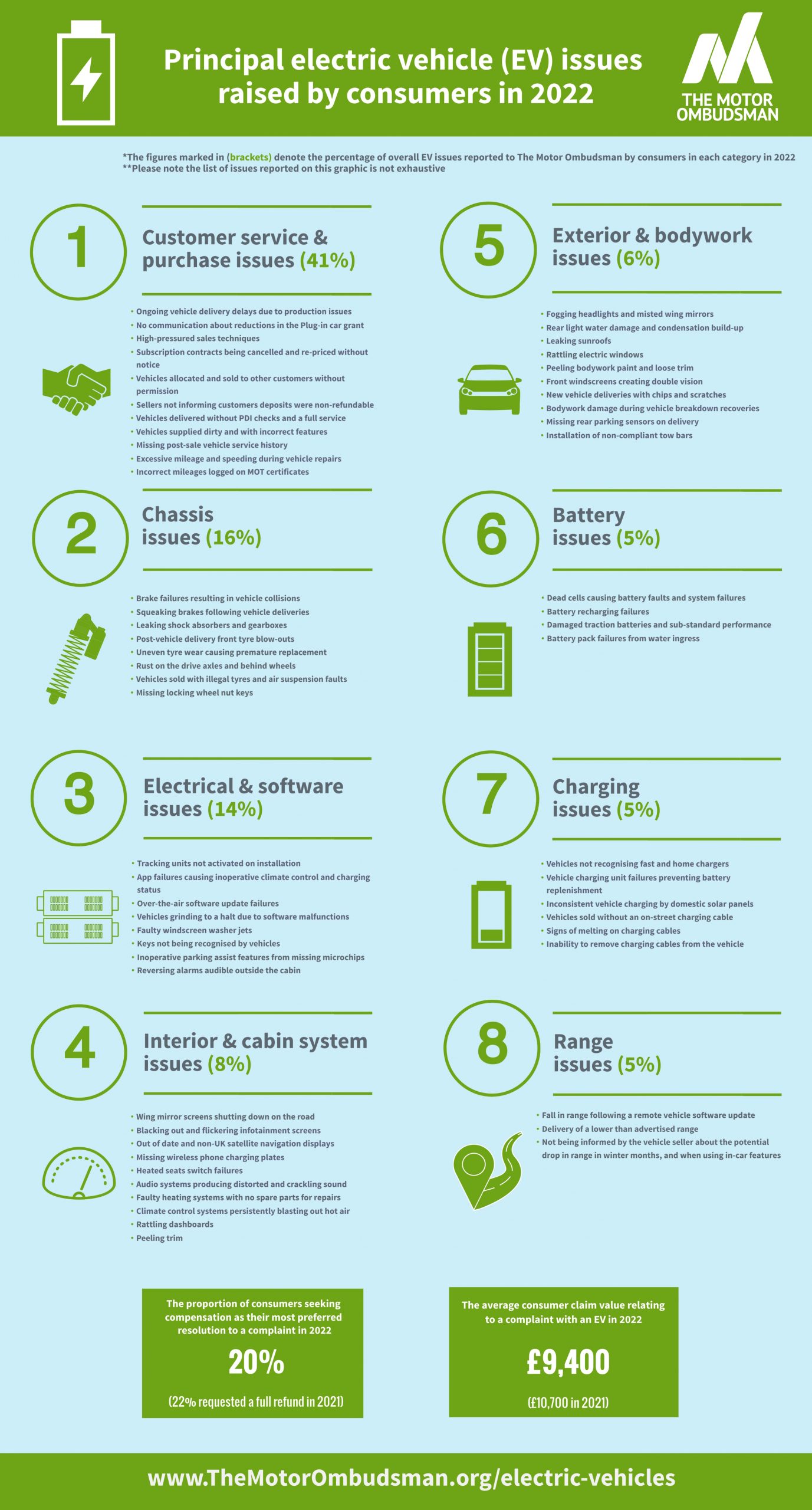Customer service and purchasing issues at the top of the list of complaints in 2022 regarding electric vehicles (EVs) to The Motor Ombudsman…
They tell us:
|
|
London, 07 February 2023 The Motor Ombudsman, the Ombudsman dedicated to the automotive sector, has revealed that issues relating to the purchase process or the service received from a business after buying a car, sparked the majority (41%) of consumer complaints about an electric vehicle (EV) in 2022. This marks an 8% year-on-year increase in the volume of disputes logged by individuals with The Motor Ombudsman for these concerns. For customers who submitted a dispute about the purchase of an EV during 2022, 83% were in conjunction with a new car, with 17% stemming from used models. In fact, new vehicle delivery delays resulting from supply chain issues and semiconductor chip shortages accounted for over 10% of customer service and purchase-related disputes. Other complaints raised by motorists originated from the use of high pressure sales techniques, and missing vehicle documentation. Inaccurate information provided to consumers, a lack of communication by sellers, as well as customer orders being cancelled by retailers without notice, equally caused dissatisfaction. The vehicle chassis area was responsible for the second largest volume of electric vehicle complaints (16%) submitted to The Motor Ombudsman’s dispute resolution service during 2022, equating to a near double increase compared to the previous year (9%). Some of the main problems reported by EV owners came from component defects and faults occurring with the brakes, gearbox, suspension and tyres. Software and electrical system glitches plagued 14% of those who submitted complaints about an electric car last year, a similar proportion to what was seen in 2021. Inoperative and unusable features, including keyless entry and windscreen wiper washer jets, app and software update failures, and sudden system malfunctions, were just some of the difficulties raised by consumers with The Motor Ombudsman last year. |
|
Similarly, the vehicle interior (8%) was not spared from technological errors, with blank infotainment and wing mirror screens, and out-of-date satellite navigation displays amongst the issues coming to the fore. In terms of the cabin aesthetics, peeling trim, missing specification, rattling dashboards, and distorted sound from the in-car audio system, emerged as key drivers of disputes. On to the exterior, and the level of complaints seen in this area encouragingly decreased to 6% (from 11% in 2021), with bodywork damage, in addition to missing and faulty external parts, generating discontent amongst EV owners. Contrary to the point of purchase and customer service problems, charging, battery and range issues made up the smallest proportion of EV complaints raised in 2022 at just 5% each, whilst they also posted an encouraging decrease versus the figures recorded in 2021 (12%, 6% and 7% respectively). Charging problems were principally orientated around missing or faulty equipment preventing the battery from being replenished. Similarly, achieving a lower-than-advertised range on a full charge, and not being informed by sellers about the potential fall in range due to colder weather and the use of in-car systems, were amongst the post-purchase frustrations. |
|
From the individuals who submitted a complaint in relation to an issue with their electric vehicle last year, compensation (20%) and a full refund (18%) emerged as the most desired resolutions to help bring their electric vehicle dispute to a close. Furthermore, for those motorists who applied a monetary amount to their preferred outcomes, the average value equated to £9,400 in 2022, falling 12% from the figure of £10,700 recorded in 2021. Bill Fennell, Chief Ombudsman and Managing Director of The Motor Ombudsman, said: “Encouragingly, concerns about electric vehicles, which were brought by consumers to our dispute resolution service in 2022, made up less than 1% of all the contacts received by The Motor Ombudsman.” |
|
Bill added: “What our latest data has also shown, and mirroring last year’s trend, is that customer service and the purchase process have once again proved to be the main bones of contention for EV buyers and owners. This means there remains a need for businesses to continue to ensure that their communications, sales and handover processes are comprehensive, fair and transparent.” For more information, visit The Motor Ombudsman’s dedicated Electric Vehicles (EV) Resource Hub at www.TheMotorOmbudsman.org/electric-vehicles. This infographic (below) provides a snapshot overall view of the complaints received… About The Motor OmbudsmanThe Motor Ombudsman is the independent and impartial Ombudsman dedicated solely to the automotive sector, and self-regulates the UK’s motor industry through its comprehensive Chartered Trading Standards Institute (CTSI)-approved Codes of Practice. Thousands of businesses, including vehicle manufacturers, warranty product providers, franchised dealers and independent garages, are accredited to one or more of the Codes, which drive even higher standards of work and service, and give consumers added protection, peace of mind and trust during the vehicle purchase and ownership experience. ownership experience. For more information on The Motor Ombudsman, visit www.TheMotorOmbudsman.org. |

